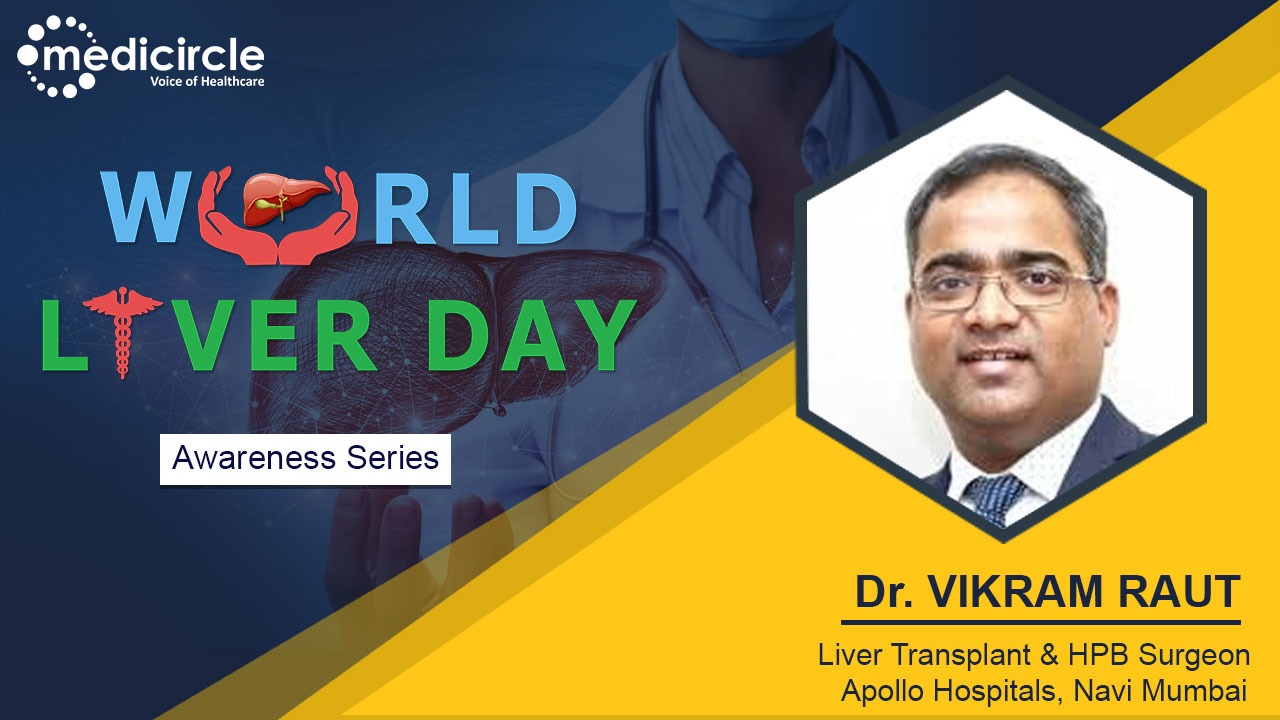The liver is an important organ that plays a central role in all metabolic processes in our body. On the occasion of World-Liver-Day, Medicircle is conducting a series with eminent hepatologists and gastroenterologists to spread awareness about vital aspects related to liver and liver diseases.
Dr. Vikram Raut is a Senior Consultant, and Lead Liver Transplant Surgeon, at Apollo Hospitals, Mumbai. He has extensive experience in living donor and deceased donor liver transplantation and has performed over 1100 liver transplants. He is trained in world-renowned centers in Japan, France, and South Korea. His licenses and certifications include the Travel Scholar Award issued by Japan Surgical Society, Young Investigator Award issued by the European Association for the Study of the Liver, and Takeda Scholar Award issued by Takeda Science Foundation, Osaka, Japan.
Liver is the supercomputer of our body
Dr. Raut mentions, “Liver is a very important organ in our body. It is like a supercomputer that performs more than 500 functions at the same time. The main functions are metabolization of food and converting it into energy. Metabolism of blood cells is also done by the liver. Immunity builder protein synthesis is another significant function of the liver. The protein that helps in blood clotting gets produced by the liver. So the liver is a very big and significant organ of our body.”
Lack of normal functioning of the liver gets identified through symptoms
Dr. Raut explains, if the liver stops doing its functions, certain symptoms start getting evident. He lists down the symptoms:
- “If Liver does not work then it manifests into jaundice. Jaundice is an indication that the bilirubin level is higher than the range. Normally the bilirubin level should be below 2 but if one is suffering from any liver ailment, then the bilirubin level shoots up to 4, 6, and even 8.
- If the liver is not functioning then there are vomits of blood or bleeding from the nose etc, as the protein that gets built up in the liver and that helps in blood clotting is not getting produced.
- If the liver is not functioning properly then there is improper metabolism of food into energy and hence a person might experience weakness as the powerhouse (liver) stops functioning properly.
- Since many proteins and immunity synthesis is not done when the liver gets damaged, there are infections like urinary tract infection
- Albumin synthesis is less when the liver is non-functioning, resulting in fluid accumulation in the abdomen, swelling in feet, etc.” says he.
Liver tests will help in taking corrective measures on time
Dr. Raut says, “We just need 30% of our liver for the amount of work it does. Symptoms of liver ailments start manifesting when 70% or more than that of our liver has stopped functioning. But before that one should definitely take preventive steps to ascertain liver health. Preventive tests should be done by ideally everyone above 40 or who is suffering from jaundice, hepatitis A or hepatitis B so that corrective measures can be taken. The tests like LFT, enzyme test, bilirubin test, liver sonography in one or two years helps in identifying liver ailments before it is too late,” advises Dr. Raut.
Fatty Liver affects 33% of people
Dr. Raut points out, “Fatty liver is so common that if there are 3 people talking in a room, 1 could be suffering from fatty liver. The liver stores energy as fat and if the fat is excess (consumption more and expenditure of energy is less) then it starts getting accumulated in the liver and other parts of the body. Fatty liver is a big reason for diabetes and abdominal girth if it is more than 86. If the waist size of pants is more than 36, then there is a risk of fatty liver.
We can perceive fatty liver in a positive way by considering it an alarming sign. If it gets identified in time you can prevent many other ailments like a heart-related ailment and if it’s not controlled then, it gets converted into NASH. If we are not able to stop it even at that stage, then it gets converted into cirrhosis and can also convert into liver cancer. If we take corrective steps from the fatty liver stage then we would not only reverse it but would also save ourselves from the risk of cardiovascular, renal, pancreatic, and liver-related morbidity,” says Dr. Raut.
Lifestyle modification is a must
Dr. Raut mentions, “Liver has regenerative capacity. Rather than supplements if you have to make lifestyle modifications then you can ensure its health. 20 mins vigorous exercise is required. Just walking is not sufficient. If after sweating you indulge in 20 mins of vigorous exercise like running, aerobics, swimming, etc. then you can ensure good liver health. Also, do not eat more than required. Mediterranean diet is good for the liver because carbohydrates are limited, protein is more, there is no alcohol and more fruits and vegetables.”
(Edited by Amrita Priya)

 Dr. Vikram Raut Senior Consultant and Lead Liver Transplant Surgeon explains the signs and symptoms of liver disease and guides how to take care of the liver to stay away from not just liver-related morbidities but also cardiovascular, renal and pancreatic complications.
Dr. Vikram Raut Senior Consultant and Lead Liver Transplant Surgeon explains the signs and symptoms of liver disease and guides how to take care of the liver to stay away from not just liver-related morbidities but also cardiovascular, renal and pancreatic complications.










.jpeg)











.jpg)








